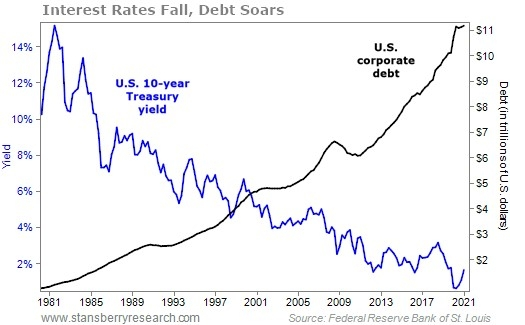Many people don't realize that there is tremendous risk in the broader stock market today. The S&P 500 is up over 20% in 2021 and the rising of tide of the overall stock market has lifted all boats. Good and not so good stocks (companies with bad balance sheets) have risen in price. If you hold ETFs and funds in your retirement account that track the overall market (S&P 500 etc…) please be aware of the financial fundamentals of the individual companies in the broader index you are holding.
The pandemic has caused corporations to increase borrowing by $1 trillion last year to more than $11 trillion today – the highest it has ever been. It has nearly doubled since the last financial crisis. The reason that highly indebted companies can afford their debt is that the Federal Reserve has implemented a near zero-interest rate policy over the last 10 years. But now the debt of many S&P 500 companies has grown so much that they many never be able to pay off their debt. You can see this inverse relationship in the chart below.

Companies that don't earn enough profits to pay for their interest costs are called "zombies." They have no hope of ever paying off their debt. Today, one out of every four public companies are considered a "zombie."
In addition, corporate credit quality is at an all-time low. The percentage of corporate borrowers who have credit ratings below investment grade – in other words, "junk" credit – is now at an all-time high of 58%. Said another way, nearly six out of every 10 borrowers in the U.S. have dubious credit ratings. That's up from 43% in 2004. The default rate increases dramatically the further you go down the credit ladder. These are the borrowers who are much more likely to default. To put it simply, corporate debt has never been larger or more burdensome than it is right now.
The truth is many companies have only been able to keep paying their bills during the pandemic by borrowing. For many old-line companies, the shift to a more digital world – as consumers continue to spend time and money differently than they did before – means sales and profits may never reach pre-pandemic levels again. This means that these companies may not pay off their debt and the only way out is bankruptcy.
In a normal credit cycle bottom, all the bad debt from the excesses of the cycle gets wiped away, leaving corporations with less leverage. That's what we saw during the last financial crisis. But that didn't happen this time. If interest rates normalize where the 10-year Treasury goes to 4-5%, many companies will face bankruptcy due to their excess borrowing. One of my favorite quotes from Warren Buffett, one of the best investors who ever lived, is: “Only when the tide goes out do you discover who was swimming naked.”
Clients of Quantum Capital know that they do not hold all the stocks in the broader indices (S&P 500, Nasdaq 100 or Russell 3000). In fact, our company name “Quantum” refers to the detailed and extensive quantitative analysis we undertake on companies that are ultimately purchased for our client’s accounts.
Our clients hold stock in 40-50 companies we have analyzed that have fortress-like balance sheets, low debt to equity ratios and strong cash positions. New positions are purchased at a discount to future potential earnings instead of chasing the hot meme stock or highly indebted companies that appear safe since they have increased in price along with the stock indices.
The day of debt reckoning may not happen tomorrow or even 3+ years from now. However, once interest rates get high enough, we may see many corporate bankruptcies which will temporarily and violently end the bull market and cause quite a few companies’ stocks to go to zero. Carefully chosen companies with strong balance sheets, low debt and strong market positions will survive any debt crisis with flying colors and most likely end up taking market share or purchasing their competitor’s assets.
Be sure to know exactly what you own, and you will never panic sell in a stock market downturn. Great businesses with the best financial fundamentals are the best bet no matter what future crisis confronts financial markets.
We need to stay partially invested in stocks because stocks are the best long-term defense against inflation and erosion of future purchasing power. If you (or your children) live another 30-50 years and inflation runs at 3%, the compounded loss in purchasing power is staggering. The price of many goods and services have gone up 10-fold in my lifetime (since 1966). If you are going to invest in the stock market for the long term, be sure there are not zombies lurking in your retirement portfolio.
Please don’t hesitate to call us with any questions or concerns about your account.
Best Regards,
John F. Henek
john@quantumcapitalinvestments.com
Quantum Capital Investments Inc.
Tax Planning * Financial Planning * Investments * Annuities and Life Insurance
|
